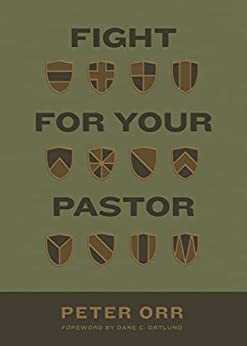This is a short book, and it's one your pastor probably won't feel comfortable recommending. But I will! Perhaps ironically, I've found myself in a few situations where I've felt the freedom to say things that others couldn't: for example, I found myself guest preaching at a friend's church on a Sunday where the congregation was meeting to discuss his continuing (interim) position, and financial recompense, and the passage set for that Sunday just happened to deal with how to treat your leaders and appropriately honouring and supporting them. I took full liberty to preach the text. Another time, I found myself set down to preach a text that speaks about partnership in mission work, in a context involving mission workers and mission supporters. I took the same liberty, to preach the text, but particularly to tackle some of the unspoken (and wrong) assumptions that mission workers experience.
And so to this book. It's written by Peter Orr, a friend of mine from seminary days, now a seminary professor, and it's indeed a short book but such a necessary one. Although I've never been a senior pastor/minister/whathaveyou, I have served in several churches in paid ministry, and I do agree that because the buck stops with the pastor, they really do bear the heaviest load, and this is what this book attempts to tackle with - how can, and should, members of a church "fight", i.e. strive to support their pastors.
As I said, a relatively short book. It's core seven chapters cover : fight (prayer), encourage, listen, give, forgive, submit, check. Orr takes us through both scriptures and application to consider how and why to pray for pastors, to encourage them in their ministry, to be active and engaged listeners and heeders of their teaching, to support them in giving generously, to forgive their faults (real and perceived), to submit to their authority, and to check them : dealing with serious accusations in a serious but appropriate way.
This last chapter is perhaps one of the most difficult. Orr writes out of, and for, a fairly conservative protestant context. There is no shortage of scandals in evangelical ministry to look at. Many, many of those are not handled appropriately. Yet, there do exist cases where false, slanderous, or otherwise wrongly laid charges are brought against those in ministry, and they also do great damage. What is needed is a process that takes accusations seriously, follows those through with proper investigation, transparency about process, victim-centered care, and yet at the same time a commitment to truth and justice that doesn't presume guilt, and will actively support accused pastors to either confess their sin and leave ministry, or else to be appropriately cared for and vindicated against false charges.
I don't think Orr's chapter entirely gets there, and I don't think it could - there's not enough space in a book of this brevity to do so, nor is he trying to. Nonetheless, there is a good balance here in terms of due process and proper support of accused pastors, without presuming pastors to be innocent (when many are not).
I have gotten a little off track. One of the great features of Orr's book is the inclusion of anonymous sections from pastors, where you get a real insight into the significant burdens, emotional pain, and secret suffering that pastors endure, can rarely share, and yet so gravely injures them, their families, and their ministry. I think if regular church members knew better some of these things, not directly from their pastors(!), they would approach their own pastors with much greater compassion and tenderness.
I don't at all think I have entirely figured out how best to support the ministry staff in my own church, I'm still a work in progress in that area, but I also do think that having been in paid church ministry, I have a better insight into where they are than most. I have made particular efforts to be more prayerful, and more encouraging, over the years. This book has encouraged me to be more intentional about this, but also to be more vocal to other church members to consider their own relationships to ministry staff.
Orr writes with a great deal of Scripture, with sensitivity, balance, and his own pastoral concern for pastors. He acknowledges early on some of his own ecclesial commitments, which situates his book for a particular audience, but I do think that even if you didn't share those (conservative complementarian evangelicalism) commitments, there's much of value in this book for anyone that sits in a church once a week (or less often).


